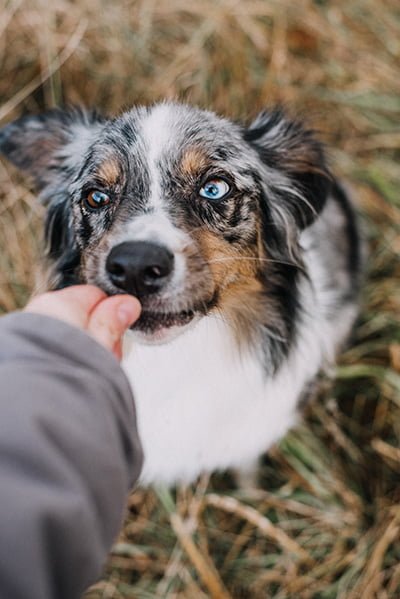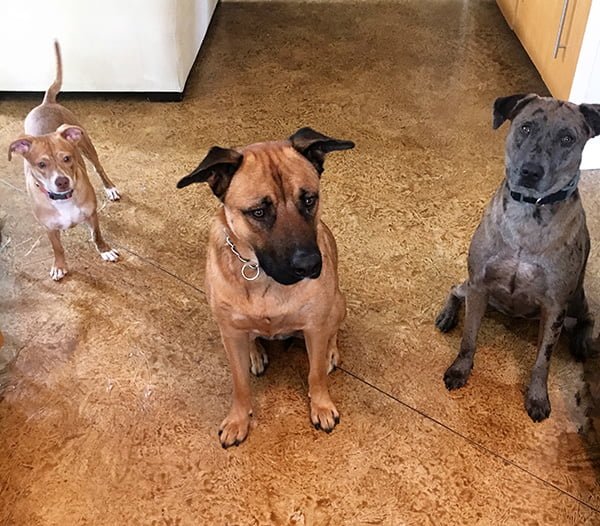Dogs like to get into human foods, but not all human foods are safe for dogs to eat! Pet owners may have heard that some nuts are dangerous for dogs to eat, but there are so many types of nuts that it can be hard to keep them straight. You may wonder - is it safe to let my dog eat pistachios? Will feeding my dog pistachios cause problems with my dog's health? Below, we'll tell you if these tasty green nuts are safe for dogs to eat and when you should steer clear of them.
Can Dogs Eat Pistachios?
Yes, dogs can eat pistachios - in moderation! Properly processed pistachios are safe for dogs if prepared properly and not overfed. There are also some health considerations specific to your dog that you'll need to keep in mind.
Health Benefits Of Eating Pistachio Nuts
Pistachios have many nutrients which dogs can benefit from. It's important to remember, however, that a dog's diet doesn't require the addition of pistachios. Your dog will receive the same nutrients from well-formulated dog food.
Vitamins
Pistachios are a good source of Vitamin K and Vitamin B6. Vitamin K aids in healthy blood clotting and wound healing. Vitamin B6 is necessary for your dog to break down and use proteins and fats, and vitamin B6 also promotes heart health.
Minerals
The two most important minerals in pistachio nuts are thiamine and manganese. Thiamine will strengthen your dog's brain function, while manganese helps your dog's digestive system break down proteins and carbohydrates.
Protein
Like many nuts, pistachios are protein-rich. Protein is needed for your pet to have strong, healthy muscles.
Dietary Fiber
Pistachios have a decent amount of dietary fiber, which is necessary to regulate your dog's digestive system.

The Downside To Dogs Eating Pistachios
Although pistachios are generally safe for dogs to eat, there are also situations where eating too many pistachios can be toxic for dogs. When feeding your dog pistachios, keep the following health risks in mind.
High Fat Content
Pistachios have a high-fat content. Granted, most of this fat is unsaturated fat, which can be beneficial in small quantities, but foods with too much fat can lead to gastrointestinal upset and diarrhea. Fatty foods have also been proven to cause weight gain and pancreatitis in dogs. Symptoms of pancreatitis include abdominal pain, loss of appetite, vomiting, diarrhea, dehydration, and lethargy.
High In Salt
Many pistachios have been salted. A dog's natural diet contains very little sodium, so it doesn't take too much salt for your pet to develop sodium ion poisoning. Symptoms of sodium ion poisoning include vomiting, diarrhea, lethargy, tremors, excessive thirst, and water retention.
Pistachio Poisoning
The Aspergillus mold is found on most tree nuts. It can grow on low-quality pistachios or pistachios that haven't been stored properly. When Aspergillus mold is consumed, it produces aflatoxin. Aflatoxin poisoning can wreak havoc on a dog's liver. Symptoms of pistachio poisoning include jaundice, lethargy, vomiting, loss of appetite, and orange-colored urine. If you believe your dog has eaten moldy pistachios, take your furry friend to the veterinarian immediately.
Choking Hazard
Pistachio shells are a major choking hazard, particularly for smaller dogs. The nuts themselves can be a choking concern for some dogs that tend to inhale food rather than chew it. Even if your dog doesn't choke on the shells, it can cause an intestinal obstruction further down the digestive system.

What Is The Best Way For Dogs To Eat Pistachios?
The most important point when it comes to feeding dogs pistachios is not to offer them in large quantities. Keep in mind that 90% of a dog's daily calories should come from their usual dog food, with the remaining 10% coming from healthy treats. A dog's daily calorie allotment depends on its size and activity level. A single pistachio nut may be the serving size for a small dog, and larger dogs could have a handful every few days.
If you decide to feed pistachios to your furry friends as an occasional treat, choose pistachios free of salt and other seasonings. Buy shelled pistachios, or remove the shells yourself. Consider adding a couple of pistachios to a blended mixture of berries and yogurt, then smearing it on a lick mat or similar toy. This removes the choking hazard altogether.
Frequently Asked Questions
Can Dogs Eat Pistachio Ice Cream?
No, dogs should not eat pistachio ice cream. Dogs can't properly process milk after they've been weaned, so any flavor of ice cream would lead to gastrointestinal distress. Ice cream is also high in sugar, which increases the risk of obesity and general digestive issues.
What Other Nuts Can Dogs Eat?
Nuts are one of those human foods you need to be careful of when it comes to feeding your dog. Some nuts, such as macadamia nuts, pecans, and black walnuts, are toxic to dogs and should absolutely be avoided. Others, such as peanuts, English walnuts, almonds, and cashews, are safe for dogs to eat. However, all nuts are high in fat and are often salted, so take care and keep the health risks in mind when using them for dog treats.
What Do I Do If My Dog Ate Too Many Pistachios?
Dogs can be mischievous little animals. If your dog got into your package of pistachios and cleaned them off, don't panic. Pistachios are not inherently toxic to dogs. Besides an upset stomach, your dog will probably be fine if it over eats pistachios once. However, if your pistachios were unshelled or salted, you should call your veterinarian. They will tell you what you should look out for or if they would prefer you to take your pet in so they can try to get your dog to vomit up the nuts.
